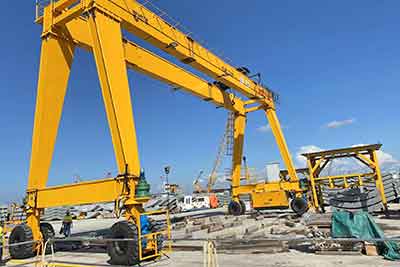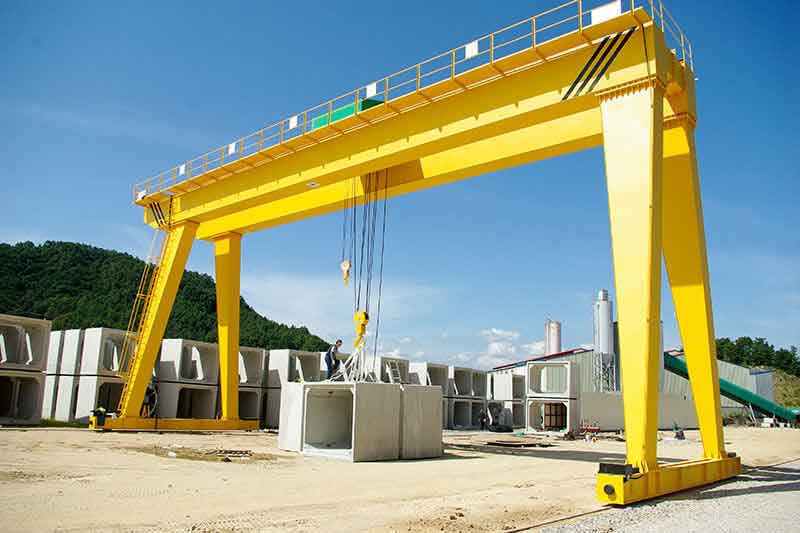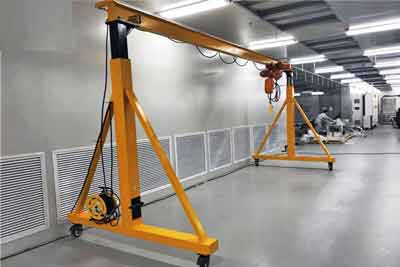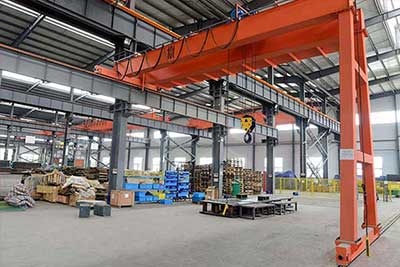A Chemical Crane is a more general term that encompasses material handling cranes used in various chemical-related applications. This can refers to the overhead cranes used in petrochemicals, pharmaceuticals, specialty chemicals, and basic chemical manufacturing.
Checmial indusrial cranes are employed to handle various chemical products, raw materials, and equipment within chemical plants, laboratories, and other industrial settings. They must meet specific safety standards and might have customizations based on the particular chemicals they handle. Some chemicals can be highly sensitive to contamination or require precise handling, so chemical cranes might have features like stainless steel construction or precise control systems to ensure safety and accuracy during lifting and transportation.
Requirements and Features:
- Safety:Checmial indusrial cranes must meet stringent safety requirements to handle hazardous materials safely. They may have spark-resistant features and explosion-proof components.
- Corrosion Resistance: Many chemicals can be corrosive, so chemical cranes often have components made of stainless steel or other corrosion-resistant materials.
- Precision Control: Some chemical processes require precise handling, so these cranes may have advanced control systems to ensure accurate positioning and movements.
- Environment Adaptation: Chemical overhead cranes may need to operate in chemically aggressive or high-temperature environments, requiring appropriate insulation and protection.
- Remote Operation: For safety reasons, remote or automated operation may be preferred in hazardous areas.
Typical Applications:
- Transporting and positioning heavy chemical containers, reactors, and vessels.
- Loading and unloading chemical raw materials and finished products.
- Supporting maintenance and repair tasks in chemical plants.
- Handling sensitive or delicate equipment and instruments in laboratories.
The specific design and features of chemical overhead cranes and gantry cranes will depend on the particular needs and requirements of each chemical sector and its processes. Safety and compliance with industry standards are of paramount importance when using these cranes in chemical environments.
The overhead cranes and gantry cranes find applications in various chemical sectors due to their ability to handle heavy loads and operate in hazardous environments. Some of the typical chemical sectors where these cranes are used include:
- Petrochemical Plants: These plants deal with the refining and processing of petroleum and natural gas to produce petrochemical products like ethylene, propylene, benzene, etc.
- Chemical Manufacturing Plants: Facilities that produce various chemicals on a large scale, such as acids, solvents, fertilizers, and other specialty chemicals.
- Pharmaceutical Industry:Checmial indusrial cranes are used to handle raw materials, equipment, and products during the manufacturing and packaging of pharmaceuticals.
- Agrochemical Industry: Handling of fertilizers, pesticides, and other agricultural chemicals.
- Specialty Chemicals: Production of specialty chemicals used in various industries like electronics, coatings, and adhesives.
- Research Laboratories: Chemical overhead cranes might be used in large research laboratories to move heavy or delicate equipment and chemicals.
Explosion proof overhead crane for chemical industry
The explosion-proof overhead cranes are widely used in the chemical industry, especially in areas where hazardous or flammable materials are present. These cranes are specifically designed to operate safely in potentially explosive atmospheres, reducing the risk of ignition and protecting personnel, equipment, and the surrounding environment.
In the chemical industry, there are often processes that involve the handling, storage, and transportation of volatile substances, which can create an environment susceptible to explosions or fires. The presence of flammable gases, vapors, or dust in certain areas requires the use of specialized equipment that minimizes the risk of sparks or other ignition sources.
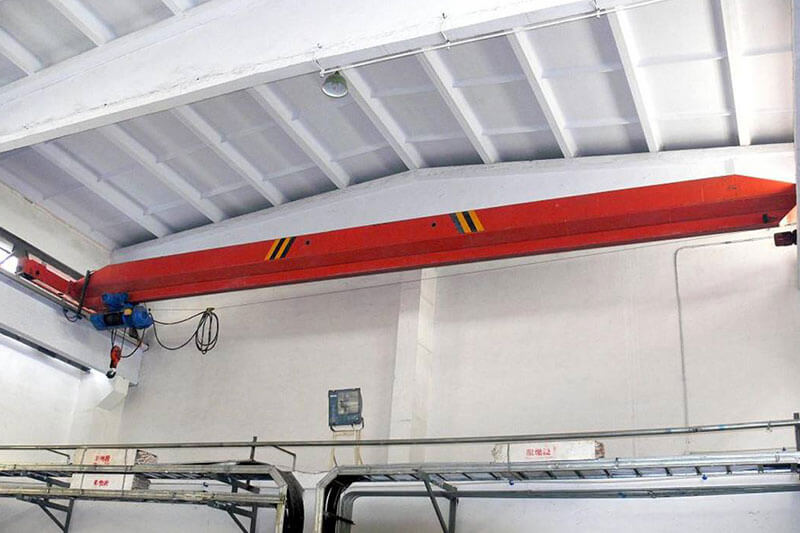
Single Girder Overhead Crane: It consists of one girder beam and is suitable for lighter loads and shorter spans. They are commonly used in smaller chemical plants and laboratories.

Double Girder Overhead Crane: With two girder beams, these cranes offer higher load capacity and are suitable for heavier loads and longer spans. They are commonly used in larger chemical manufacturing facilities and petrochemical plants.
Explosion-proof overhead cranes have several important features and modifications that make them suitable for use in such hazardous environments:
- Spark-Resistant Components: The bridge crane's electrical components, including motors, switches, and control systems, are designed to prevent sparks or arcs from occurring during operation.
- Enclosed Design: The overhead crane's electrical components and wiring are enclosed in protective housings to prevent contact with potentially explosive substances.
- Explosion-Proof Wiring: The wiring used in the bridge crane is designed to prevent electrical discharges that could cause ignition.
- Corrosion Resistance: Chemicals can be corrosive, so explosion-proof cranes often have corrosion-resistant materials to withstand harsh environments.
- Safety Limitations: The cranes may have additional safety features, such as overload protection and emergency stop systems.
By using explosion-proof overhead cranes, chemical plants can adhere to strict safety regulations and prevent accidents that could lead to catastrophic consequences. These cranes are commonly used in areas such as storage yards, process areas, loading/unloading stations, and locations where flammable or hazardous chemicals are handled.
It's important to note that the specific requirements for explosion-proof cranes may vary depending on the chemical processes and local safety regulations. As such, it's essential for chemical industry operators to work with crane manufacturers and safety experts to ensure the correct design, installation, and maintenance of these specialized cranes.
Types of Gantry Cranes:
In the chemical industry, different types of gantry cranes are used to cater to various material handling needs. The specific type of gantry crane chosen depends on factors such as the load capacity, span, and the environment in which it will operate. Here are some common types of gantry cranes used in the chemical industry:
Rubber-Tired Gantry Crane (RTG):
- Features: RTGs are mobile gantry cranes equipped with rubber tires, allowing them to move freely on paved surfaces. They are typically powered by diesel engines or electric batteries.
- Advantages: RTGs are highly versatile and ideal for outdoor applications in chemical storage yards or handling areas where a fixed crane rail system is not feasible. They offer excellent mobility and flexibility in moving containers and heavy loads.
- Limitations: RTGs have limited lifting capacity compared to larger fixed gantry cranes. They are more suitable for medium-sized loads and are not recommended for very heavy loads.
Rail-Mounted Gantry Crane (RMG):
- Features: RMGs run on rails and are often used in container yards and intermodal facilities. They are powered by electricity.
- Advantages: RMGs provide efficient and precise container handling along the rails. They can be automated, making them suitable for high-throughput chemical storage yards.
- Limitations: RMGs require a fixed rail infrastructure, which might limit their mobility and flexibility compared to RTGs.
Adjustable (Mobile) Gantry Crane:
- Features: These gantry cranes are designed to be adjustable in terms of height, span, and width. They are often equipped with wheels for easy movement and positioning.
- Advantages: Adjustable gantry cranes can be customized to suit specific material handling needs in chemical facilities. They offer versatility and ease of mobility.
- Limitations: Depending on the design and load capacity, some adjustable gantry cranes might have lower load capacities compared to fixed gantry cranes.
Semi-Gantry Crane:
- Features: Semi-gantry cranes have one end supported by a building or structure, while the other end runs on rails or is supported by a leg with wheels.
- Advantages: Semi-gantry cranes are suitable for areas with limited space or where a full gantry structure is not feasible. They offer some of the benefits of gantry cranes while minimizing the required supporting structure.
- Limitations: The load capacity and span of semi-gantry cranes might be limited compared to fully supported gantry cranes.
The type of gantry crane chosen for the chemical industry depends on the specific material handling requirements, available space, load capacity, and the safety considerations associated with the handling of chemical products. It is essential to consider safety features, explosion-proofing (if required), and any other special requirements based on the chemical handling processes when selecting a gantry crane for chemical industry applications.




